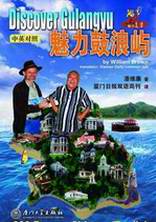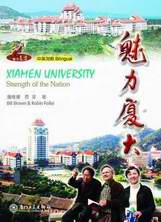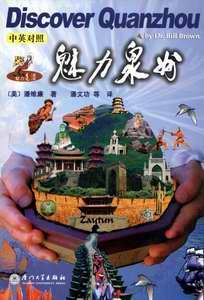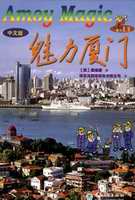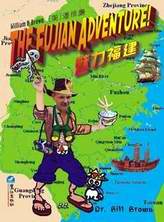![]() Click
to
Access
Click
to
Access
OUTSIDE China
![]() Click
to Access
Click
to Access
INSIDE
China ![]()
TRAVEL LINKS
![]() Xiamen
Xiamen
![]() Gulangyu
Gulangyu
![]() Jimei
Jimei
![]() Tong'an
Tong'an
![]() Jinmen
Jinmen
![]() Zhangzhou
Zhangzhou
![]() Quanzhou
Quanzhou
![]() Wuyi
Wuyi
![]() #1Fujian
Sites!
#1Fujian
Sites!
![]() Fujian
Foto Album
Fujian
Foto Album
![]() Books
on Fujian
Books
on Fujian
![]() Readers'Letters
Readers'Letters
![]() Ningde
Ningde
![]() Zhouning
Zhouning
![]() Longyan
Longyan
![]() Sanming
Sanming
![]() Putian
Putian
![]() Bridges
Bridges
![]() Travel
Info,
Travel
Info,
![]() Hakka
Roundhouses
Hakka
Roundhouses
![]() Travel
Agents
Travel
Agents
MISC. LINKS
![]() Amoy
People!
Amoy
People! ![]()
![]() Darwin
Driving
Darwin
Driving ![]()
![]() Amoy
Tigers
Amoy
Tigers
![]() Chinese
Inventions
Chinese
Inventions
![]() Tibet
in 80 Days!
Tibet
in 80 Days!![]()
![]() Dethroned!
Dethroned!
![]()
![]() Misc.Writings
Misc.Writings
![]() Latest
News
Latest
News
![]() Lord
of Opium
Lord
of Opium
![]() Back
to Main Page
Back
to Main Page
![]() Order
Books
Order
Books![]() Xiamenguide
Forum
Xiamenguide
Forum 
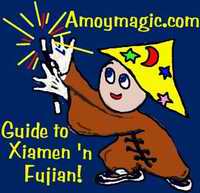
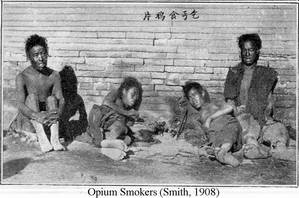 He who
sacrifices his conscience to ambition burns a picture to obtain the ashes.
Chinese Proverb
He who
sacrifices his conscience to ambition burns a picture to obtain the ashes.
Chinese Proverb
For over a century, Western nations trafficked in opium on a scale that
dwarfs any modern Colombian multi billion dollar drug empire, yet today
we Westerners know little about it. We don't learn about it in high
school history--or even college, for that matter. I had an American
professor in Xiamen tell me that he thought the war was fought to keep
China from exporting opium.
Most Westerners by far opposed the trade. Even the British opposed it. The entire British parliament opposed the 2nd Opium War--and was dissolved. In the 1880s, when the U.S. made it illegal for Americans to engage in the opium trade, a Chinese leader said, "This is the first time that I've seen a Christian nation act like a Christian country." But the trafficking continued until, by the 1920s, fully half of Europe’s Asian profits derived from opium. While only asmall minority benefited from the trade, that minority controlled the fate of half the world's population in China and India, and dictated Western policy as well.
Just
Say No? 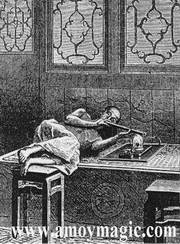 China, not America, started the first “Just Say No!” anti-drug
program. Chinese leaders appealed to our sense of morality and justice,
and the “Way of Heaven.” The West responded with a “Just
Say Yes!” campaign and two wars to implement it, and America’s
ex-President Adams made our first complaint against China’s human
rights by declaring that her refusal to import opium was a violation of
‘the rights of men and nations.’
China, not America, started the first “Just Say No!” anti-drug
program. Chinese leaders appealed to our sense of morality and justice,
and the “Way of Heaven.” The West responded with a “Just
Say Yes!” campaign and two wars to implement it, and America’s
ex-President Adams made our first complaint against China’s human
rights by declaring that her refusal to import opium was a violation of
‘the rights of men and nations.’
Before my quick
overview of the Opium Wars, lets read "The Opium Den," from
Reverend John Macgowan's "The Story of the Amoy Mission" (1889,
p.180).
“The shops today are all busy, for customers crowd into them during the busiest hours of the fair. But how is it that, interspersed amongst them, there are so many houses with bamboo screens hanging in front of the open doors? Let us enter one, for it is not
a private house. It is an opium den. We put the screen aside, and come into a dimly lighted room, with a broad bench running round the sides of it. Little lamps are placed at various intervals, and men are reclining beside them. Some are asleep, and most ghastly do they look with their haggard, opium-hued faces. They are stretched on their backs, and they seem as if they were corpses. They don’t appear like men whose spirits are wandering in fairy land, and are entranced with gorgeous scenes of beauty, such as the opium smoker is said to enjoy… One man smiles at me [and says], “This comes from your country, doesn’t it?” I feel distressed, for I know he does but express the common opinion that all opium comes from England. But this opium den is an unsavoury place to be in. The close, horrid smell, the ghastly figures ranged along the benches, and the sense of being in the midst of some of the very lowest of the population, are oppressive. We hear the sounds of voices outside, and we see the rays of the bright sun shining upon the bamboo mat, and we rush out of the dim, fetid place, with a sense of deliverance, into the open air.”
But there was no deliverance for those inside.
My goal is always the same: to invoke the past as a shield for the future, to show the invisible world of yesterday and through it, perhaps on it, erect a moral world where men are not victims and children never starve and never run in fear.” Elie Wiesel, Nobel Laureate (in "A Personal Response")
The Birth of the Opium Trade
European opium smugglers
flirted with China’s death penalty as early as 1729, for opium’s
immense profits were more addictive than the poppy. The only problem was
supply, which Britain solved in 1756 by conquering Calcutta.
Clive marveled at India, the “rich and 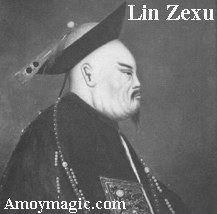 flourishing
kingdom.” Within decades that rich kingdom was pauperized as farmers
were forced to abandon traditional crops and to grow what became the Crown’s
primary cash crop, and China’s main import—opium.
flourishing
kingdom.” Within decades that rich kingdom was pauperized as farmers
were forced to abandon traditional crops and to grow what became the Crown’s
primary cash crop, and China’s main import—opium.
Warren Hastings, India’s first governor-general, wrested control
of the Dutch opium trade, rapidly expanded poppy production, and dispatched
two opium-laden ships to Canton on a trial run. One was shipwrecked, but
the other evaded Chinese officials and sold 200,000 pounds of opium in
Huangbo.
After an English census of China revealed 300 million potential “clients,”
the Crown awarded the Honorable East India Company a monopoly on the ‘trade,’
carefully avoiding the use of the word ‘opium’—a face-saving
subterfuge employed right into the 20th century. (For the record, the
majority of British merchants and missionaries protested against Britain’s
foray into drug trafficking, but to little avail).
On Dec. 2, 1799, a distraught emperor penned an anti-opium edict, noting: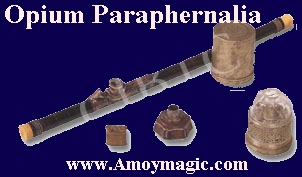
“The infirm and weak perish gradually from want and hunger, while the strong and vigorous become thieves and robbers, the ultimate ruin of all being thus equally certain and inevitable.”
But Britain saw not
ultimate ruin but a 2,000% profit on each 130 pound chest. The Company
sold 3,000 chests in 1790 and 30,000 chests in 1836. Between 1820 and
1835 alone, China’s addict population grew 50 fold.
Lord Hastings maintained that Britain’s opium smuggling was carried
out ‘in compassion to mankind’, but the Emperor wrote that
foreigners,
“smuggle in prohibited opium, which flows and poisons the land.
When this conduct is referred to the heart, it must be 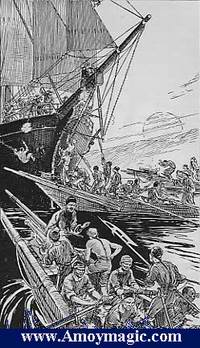 disquieting;
when referred to reason, it is contrary to it.”
disquieting;
when referred to reason, it is contrary to it.”
After the Dao Guang
emperor’s 3 sons, including his heir, died of opium addiction, he
ordered the viceroy at Canton to tighten up controls. He lambasted Britain
as “a Christian nation devoid of four out of the five Virtues.”
Indignant opium smugglers demanded that Britain redeem her honor, but
parliament urged patience, reasoning that the Emperor would give in when
he saw the magnitude of the profits to be made. But the Emperor refused
the part of Judas. He wrote,
“It is true that I cannot prevent the introduction of the poison;
gainseeking corrupt men will, for profit and sensuality, defeat my wishes;
but nothing will induce me to derive a revenue from the vice and misery
of my people.”
As the stakes grew, so did the smugglers’ audacity. In Feb. 1832,
Lord Amherst sailed up the coast from Canton to seek opium markets. In
a Fujian harbor he assured Chinese officials that his ship was actually
on its way to Japan from Calcutta and had been driven ashore by the storm.
It was harder for him to explain away his crates of Chinese leaflets advertising
for coastal trade outlets.
Chinese protests
in Canton were fruitless. The indignant British protested they’d
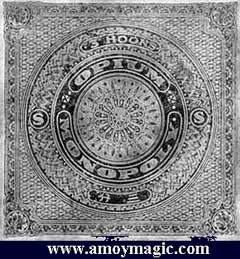 never
heard of such a ship – technically true, since Lord Amherst had
used a fake name on the vessel. Arthur Waley, in The Opium War Through
Chinese Eyes, concluded, “It is not surprising that during his Canton
days Lin worked on the hypothesis that nothing the English said could
be relied upon.”
never
heard of such a ship – technically true, since Lord Amherst had
used a fake name on the vessel. Arthur Waley, in The Opium War Through
Chinese Eyes, concluded, “It is not surprising that during his Canton
days Lin worked on the hypothesis that nothing the English said could
be relied upon.”
Lord Amherst’s escapade was lauded in London, where the House of
Commons sanctioned the production and sale of opium. Lord Shaftsbury later
testified that the government not only encouraged the use of the drug
but carefully studied the tastes of Chinese addicts to “inflame
the temptation so as to ensure an ample demand.”
In 1836, the angry Emperor issued yet another edict ending in “Tremble.” An indignant Lord Napier ended his reply with, “Therefore tremble, Governor Lu, intensely tremble.”
Governor Lu reluctantly
dispensed with diplomacy and blockaded the river above and below the foreign
merchants’ ships, and a humiliated Lord Napier conceded defeat.
When Napier fell ill, Governor Lu sent him to Macao, where he died, becoming
a martyr to the opium cause.
Furious Westerners demanded revenge for Napier’s death. Matheson,
the premier opium merchant, lambasted the unwavering Chinese mandarins
as “imbecile, avaricious and obstinate,” and demanded that
Britain force open more ports for free trade. Jardine and Matheson built
sleek teak ships, armed them to the teeth, and sailed the coast, plying
what Matheson persisted in calling the harmless ‘merchandise China
needs.’
Even as Britain promoted
opium in China, she passed several laws forbidding its use in England.
Western medical experts supported such dual standards by arguing that
for Chinese, opium was “a harmless social family luxury,”
on a par with tea. The Deputy-Surgeon-General of Bombay would later claim
that Chinese find in opium “a source of enjoyment, of comfort, of
necessity, and of even a blessing.” He added, “Opium is especially
suited to the Chinese constitution, habits, and to the small pecuniary
means of the masses.”
A Western writer in the “Chinese Repository” (Nov. 1836, vol.
V., p. 300) had different views. He accused traffickers of murder and,
“the perpetuating and encouraging and engaging in a trade which
promotes idleness, disease, poverty, misery, crime, madness, despair,
and death.”
An Assam tea plantation superintendent wrote that to obtain opium, addicts “will steal, sell his property, children, the mother of his children; and finally even commit murder.” Walter Medhurst, the London Missionary Society’s tireless opponent of the opium trade, described the ‘harmless’ drug’s effects:
“In proportion as the wretched victim comes under the power of the infatuating drug, so his ability to resist temptation is less strong; and debilitated in body as well as in mind he is unable to earn his usual pittance. Shut out from his own dwellings, either by angry relatives or ruthless creditors, they die in the streets, unpitied and despised.”
Britain was unmoved. In fact, she transformed her sordid traffic into
a moral crusade, arguing that opium was China’s salvation, for without
it the over-populated Chinese would grow poppies instead of food.
The
Way of Heaven
In a poignant letter to Queen Victoria, Imperial High Commissioner Lin
Zexu wrote:
“I am told that in your own country opium smoking is forbidden under severe penalties. This means that you are aware of how harmful it is. So long as you do not take it yourselves, but continue to make it and tempt the people of China to buy it, such conduct is repugnant to human feeling and at variance with the Way of Heaven.”
“The Way of Heaven,” Lin argued, was:
“…fairness to all; it does not suffer us to harm others in order to benefit ourselves. Men are alike in this all the world over: that they cherish life and hate what endangers life. Your country lies 20,000 leagues away; but for all that the Way of Heaven holds good for you as for us, and your instincts are not different from ours; for nowhere are there men so blind as not to distinguish what brings profit and what does harm…”
But for Britain,
the profit justified the harm. On April 6, 1843, the Times would sum up
Prime Minister Robert Peel’s position:
“Morality and religion,
and the happiness of mankind, and friendly relations with China, and new
markets for British manufactures were all very fine things in their way;
but that the opium trade was worth to the Indian government £1,200,000…”
Reluctantly, Commissioner Lin gave the British a 3-day ultimatum, and after waiting a full week for a response, he blockaded the harbor. During the foreigners’ confinement, Cohong merchants carefully preserved the Westerners’ property from harm, and insured that their foreign prisoners wined and dined in comfort. Lin reasoned that if he treated his foreign prisoners with respect and courtesy, they would recognize the error of their ways, abandon the opium trade, and turn to legitimate pursuits. But Western newspapers trumpeted China’s barbarous treatment of Europeans, and stoked up the war propaganda machine.
Up
in Smoke
A sullen Captain Elliott surrendered 20,283 chests of opium, valued at
£2 million. It took Lin six weeks to destroy it, and as gray smoke
clouded Canton’s sky, he noted of foreign observers, “I should
judge from their attitudes that they have the decency to feel heartily
ashamed.”
But anger, not shame, reddened their faces. In July 1839, the British
destroyed and scattered 29 Chinese war junks. Unsuspecting peasants rushed
to greet British ships off TingHai on July 5th. In “Six Months with
the Chinese Expedition” (1841), Lord Jocelyn described the British
greeting:
“The ships opened their broadsides upon the town, and the crashing of timber, falling houses, and groans of men resounded from the shore…We landed on a deserted beach, a few dead bodies, bows and arrows, broken spears and guns remaining the sole occupants of the fields.”
If
the trade is ever legalized, it will cease to be profitable from that
time. The more difficulties that attend it, the better for you and us."
.................................-- Directors
of Jardine-Matheson
Rather than submit,
city officials committed suicide, for as Waley wrote,
“It had not from the first any chance of withstanding the concentrated
fire of fifteen warships; as well might one expect Hiroshima to have hit
back at its attackers.”
British troops immediately launched a protection racket (“security placards”) by which families purchased immunity from plunder if they voluntarily surrendered their livestock. “The Chinese Repository” (1840) recorded:
“They [the Chinese] have in a thousand instances received great injustice at our hands. While we have been issuing proclamations, talking sweet words…our soldiers and sailors have been plundering them and forcibly carrying off their poultry and cattle…”
The soldiers consoled
their victims by plastering the town with proclamations encouraging the
survivors to flock to Sui-Shan, where “opium is on sale very cheap—an
opportunity not to be missed.”
Surrender A devastated China
surrendered. Under the Nanking Treaty (June 26, 1843), China agreed to
pay an indemnity of £6,000,000 for the destroyed opium (three times
its value) and cede Hong Kong to Britain. This settlement infuriated Lord
Palmerston, who complained that six million did not cover the cost of
the destroyed opium or the punitive expedition. The Times ridiculed this
claim, arguing that Britain owed China compensation for “pillaging
her towns and slaughtering her citizens in a quarrel which would never
have arisen if we had not been guilty of an international crime.”
The Crown countered critics by arguing that the war was over free trade, not opium. And Sir John Davis, who became governor of Hong Kong in 1844, declared that the Chinese weren’t sincere about prohibiting opium, and that Britain had never forced the issue. He protested that ritain “only supplied the poison, which the Chinese were not obliged to take.”
Since the Nanking Treaty studiously avoided the word ‘opium,’ the drug technically remained illegal. Britain even promised in a supplementary treaty that British officers would end the smuggling entirely. Empty words. When Captain Hope of the H.M.S. Thalia prevented several opium-laden ships from proceeding past Shanghai, he was criticized for interfering with British subjects in the course of their ‘trade,’ relieved of duty, and packed off to India.
Hitchhiking
Imperialism
When a large vessel has opened a way it is easy for a small one to follow.
.
Chinese Proverb
Western nations
unanimously applauded Britain’s victory. America
rushed envoy Caleb Cushing to China, with three gunboats, to conclude
a treaty of “everlasting friendship.” He told the Chinese,
“The late war with England was caused by the conduct of the authorities
at Canton, in disregarding the rights of public officers who represented
the English Government.”
Cushing added that if China had not learned her lesson, “it can be regarded in no other light than evidence that she invites and desires [war with] the other Western powers...
A French diplomat followed on Cushing’s heels with seven French warships in tow and similar demands for everlasting friendship and trading rights.
Though Britain had
fought a war to protect her opium trafficking, opium was opposed by most
merchants, manufacturers, government leaders and missionaries, on economic
as well as moral grounds. One merchant proved statistically that the opium
trade had destroyed legal commerce and that in “supplying the Chinese
with an intoxicating drug, we are drying up their natural capacity to
consume our manufactures.”
Pottinger coined a stock answer: “If India does not produce it,
other countries will.” He added smugly that if the Chinese were
truly such a virtuous people, they “would neither use the opium
nor permit it to be smuggled.”
China continued to resist the opium trade, and in the 1850s, Lord Palmerston
warned, ‘The time is fast approaching when we shall be obliged to
strike another blow in China.’ He explained, ‘these half-civilized
governments such as those of China, Portugal, Spanish America…require
a dressing down every eight or ten years to keep them in order.”
Dressing
Down China – The Arrow War
The excuse for China’s ‘dressing down’ came from Hong
Kong, which teemed with Chinese criminals and pirates luxuriating under
the protection of the Crown. Commissioner Yeh seized the Chinese ship
“Arrow”, and convicted twelve of its notorious Chinese pirates.
The British furiously demanded the criminals’ release, arguing they
had been taken from a British ship entitled to British protection. Lord
Derby ridiculed the charge:
“Chinese built, Chinese captured, Chinese sold, Chinese bought and
manned, and Chinese owned. And that is the British vessel which is said
to be entitled to claim the protection of a treaty by which British ships
are exempted from the visits of the Chinese authorities.”
Commissioner Yeh surrendered the pirates, but refused Sir John Bowring’s
demand for an apology. Britain now had her excuse for China’s “dressing
down.”
With characteristic hyberbole, Palmerston denounced Commissioner Yeh as “one of the most inhuman monsters that ever disgraced a nation.” On Feb. 3, 1857, Britain declared war because of China’s “acts of violence, insults to the flag and infraction of treaty rights.”
Parliament unanimously opposed the second Opium War, agreeing with Lord Derby’s sentiment that the war was “the shedding of the blood of unwarlike and innocent people without warrant of law and without the warrant of moral justification.” Lord Palmerston accused the dissidents of disloyalty to the Crown, dissolved Parliament, and went to war anyway.
When the Chinese refused to ratify the Treaty of Tiantsien, British and French forces attacked Beijing and burned the Summer Palace to the ground. Besieged from all sides, China succumbed, ending a full century of resistance. Opium was finally legalized, and imported at a lower duty than England, the proponent of “free trade,” levied on Chinese silk and tea.
Scapegoat
The English now intensified a two-decade effort to convince Western
public opinion that Britain had never forced opium on China. Mr. Gladstone,
in the opium debate in Parliament on May 10, 1870, argued that the Chinese
government had ‘wisely’ decided to deal with opium as a commercial
commodity. Gladstone praised the opium trade as not only a source of revenue
but of great benefit to China and India:
“This is one of the most remarkable cases which the whole fiscal
history of the world presents. I do not suppose there is, or ever has
been, a country…in which £6,000,000 of its revenue has been
derived from a particular article [he still evades the word ‘opium’],
of which you could say with so close an approximation to the truth, without
any violation whatever of political justice, that the 6 million was virtually
and substantially paid by the inhabitants of another country who did not
complain of the burden.”
The London Times (Oct. 22, 1880) claimed that “the Chinese government admitted opium as a legal article of import, not under constraint, but of their own free will, deliberately.” Lord Curzon, later Under Secretary for India, “denied that England had ever forced opium upon China; no historian of any repute, and no diplomatist who knew anything of the matter, would support the proposition that England coerced China in this respect.”
Born and
Bred to the Opium Pipe
Westerners had long held the vast, ancient kingdom of Cathay
in awe, but by the end of the Opium Wars, Chinese were beneath contempt,
mere creatures born and bred to the opium pipe. It is ever thus, for gross
atrocities, whether in China or Auschwitz or South Africa or Nicaragua
or the antebellum South, can be sustained only by dehumanizing our prey
and by canonizing ourselves. Britain argued that not only did the Chinese
want opium but that their physical constitution required it, and that
the British opium monopolies throughout Asia were a humanitarian service
for the Chinese.
As the dragon sank into opium dreams, Shaftbury’s prophecy was fulfilled:
easy money killed honest money. In 1877, Mr. Samuel S. Mander wrote that
of China’s £12 million in imports from India, the 85,000 chests
of opium counted for £10.5 million, leaving £1.5 million for
legitimate trade.” Legitimate merchants suffered as China’s
moral and economic foundation foundered, and private bankers in London
warned, “The purchasing power of China seems paralyzed by the opium
trade.” Sir Arthur Cotton, a well known authority on India, argued
in a letter to the Anti-Opium Society (May 6, 1882), “…there
is not a shadow of excuse for our continuing this trade…”
He affirmed,
“the astonishing fact that we are perfectly independent of the opium
revenue, having a clear surplus of £3.5 million without it, and
that revenue increasing at the rate of £500,000 a year!”
Opium apologists argued that Indian farmers needed opium profits, but
Sir Cotton proved that the farmer could make 4 times as much profit from
an acre of sugar as he could from an acre of poppies. But like Chinese
opium addicts, Britain’s Indian poppy farmers were expendable. And
expended they were.
Britain’s mandatory substitution of poppies for traditional food
crops ended with Indian mothers feeding their emaciated children opium
to ease the gnawing hunger that plagued them from their beleaguered birth
to their premature death.
In 1838, 800,000 Indians died in the Agra famine. Over 500,000 starved
in 1860 in the Northwest, and in 1865-7, one million perished in the Orissa
Famine – 1/3 of that area’s population. In 1868-70, 1/3 of
the Rajputana population perished of hunger.
Embarrassed by the public outcry in Europe, Britain adopted a simple famine
relief program. Only 28 died in the Bihar Famine of 1873-4, but at one
dollar per life, Britain abandoned the program as too costly. Two years
later, India’s British masters idly watched the South India Famine
destroy 5.25 million people in British territory alone. Another 750,000
starved in the 1896-7 famine, and in 1899, 2.5 million perished. But the
poppy prospered.
Fighting Fire With Fire
China reluctantly decided to destroy the Western opium trade by flooding
the market with domestic opium. It was a painful decision, for Chinese
rulers held that production of opium, for any reason, would “provoke
the judgment of Heaven and the condemnation of men.”
It certainly provoked Britain’s condemnation, which resented China’s
infringement upon her private opium monopoly. By 1876, China was earning
over 1.5 million annually from opium, but Sir R. Alcock told the House
of Commons that China would gladly abandon the trade if Britain stopped
her own trafficking.
Five years later, Sir R. Alcock, the stalwart anti-opium crusader, sold
out.
Turncoat
In December 1881, Sir Alcock shocked anti-opium advocates with his article
“Opium and the Common Sense.” He claimed that opium was no
more harmful than alcohol and insisted:
1) “In early years, the Chinese were insincere in prohibition…”
2) “The British government never had forced opium on China; the
Chinese were always eager to take more than India could supply.”
Mr. B. Fosset Lock explained Sir Alcock’s betrayal in his article “The Opium Trade and Sir Rutherford Alcock (Contemporary Review, April, 1882). It turned out that only one month before publishing “Opium and the Common Sense,” Sir Alcock had been made a director of the British North Borneo Company, an affiliate of Dent, the premier opium trading firm. Alcock proved to be an even better opium trafficker than moral crusader. By the 1920s, fully 100% of Britain’s income from North Borneo came from the opium trade.
China’s
Death Rattle
The ranks of addicts now swelled with women and children. In 1889, Mr.
Samuel Smith declared before the House of Commons, “one thing is
certain: unless the vice is combated, China will commit something like
national suicide and her population will succumb to pauperism, famine
and death.” He asked Britain to make a sacrifice by ending the trade,
for “nothing ennobles a nation more than to make sacrifices for
a great cause.”
Britain’s ennobling response was the Royal Opium Commission’s
2,556 page report, which concluded that opium was no worse than alcohol
and, furthermore, “there is no evidence from China of any popular
desire that the import of Indian opium should be stopped.”
China’s Viceroy, Chang Chih-Tung, begged to differ. In 1896, he
wrote in “China’s Only Hope”:
Cast out the poison! The foreign drug is debasing the homes and sweeping
away the lives of our people.
“It is not foreign intercourse that is ruining China, but this dreadful
poison. Oh, the grief and desolation it has wrought to our people! Opium
has spread with frightful rapidity and heartrending results through the
provinces. Millions upon millions have been struck down by the plague…The
ruin of the mind is the most woeful of its many deleterious effects. The
poison enfeebles the will, saps the strength of the body, renders the
consumer incapable of performing his regular duties, and unfit for travel
from one place to another. It consumes his substance and reduces the miserable
wretch to poverty, barrenness, and senility…Many thoughtful Chinese
are apprehensive that opium will finally extirpate the race…”
In 1901, French writer
and Naval officer Pierre Loti wrote, “China is dying of this poison.”
In 1906, a memorial to the Emperor claimed,
“China can never become strong and stand shoulder to shoulder with
the powers of the world, unless she can get rid of the habit of opium
smoking by her subjects, about one-quarter of whom have been reduced to
skeletons and look half dead.” (China Times, Jan. 16, 1906)
Cold Turkey
In 1907, the Dowager Empress vowed to eradicate the opium scourge within
ten years. By June, all 700 opium dens in a Chinese-controlled city had
been closed, and by mid 1910, China had reduced by 70 to 85 percent her
domestic production of opium.
Meanwhile, Britain continued to insist that China had started the opium
problem and was insincere about ending opium use.
Ironically, when impoverished Chinese farmers voluntarily torched their
poppy fields, they actually boosted the profits of wealthy British traffickers
by creating an opium shortage. Still, Britain mourned its alleged losses
and complained about unsold stocks of opium in Shanghai and Canton warehouses.
Chinese officials in Shanghai responded by purchasing 1,200 chests of
opium, worth $25 million, and consigning it to the torch, evoking memories
of Lin Ze Xu’s conflagration a century earlier. China declared solemnly
that, from that date, opium could no longer be imported legally into China.
The British, old hands at smuggling, were unfazed.
On Feb. 26, 1924, a steamer hauled 180 cases of opium to Shanghai. Thousands
of cases more were never discovered. Even John Campbell, representative
of the Indian government, confessed that most smuggled opium “came
in steamers from Liverpool and London, and steamers from the latter port
arriving with 3,000 pounds of opium.” He said,
“The statistics showed beyond a shadow of a doubt that hundreds
of thousands of ounces (in one year, almost 800,000 ounces) had been sent
to the Far East for illicit introduction into China. China did not produce
an ounce of morphia herself…”
The pleasure of what we enjoy is lost by coveting more.
Chinese Proverb
New Markets
As China tightened her borders, Britain pinned her hopes on her other
Asian colonies. Opium production in the Straits Settlements (Singapore,
Penang, Malacca, Labuan) rose from 353,938 pounds in 1916 to 370,688 pounds
in 1920, in spite of Britain’s promise at the Hague Convention to
limit opium sales. In 1918, 60% of Britain’s Asian income was derived
from opium sales. In 1925, opium accounted for 48% of Singapore’s
revenue, and 100% of North Borneo’s. At the 1923 Opium Conference,
Mr. Campbell admitted that the British Indian government was determined
to maintain high levels of both internal consumption and export, and that
they,
“controlled the production, distribution, sale, possession –
every possible practical question which could arise in connection with
opium—in the strictest possible manner—They had built up a
complicated and highly efficient administrative system which started from
the time the poppy seed was put into the ground, and did not relinquish
control of the drug until it was in the hands of the consumers, or till
it was actually exported.”
Some wits noted wryly that the Crown did all but light the addicts’ pipes.
When Indians begged Britain to abandon the opium policy, Britain responded that her opium monopoly was a humanitarian service to India (as it had been to China), and that to end the trade would be “a mockery; to many millions it would be sheer inhumanity.”
History teaches us
that men and nations behave wisely once they have exhausted all other
alternatives.
Abba Eban, Israeli politician
Coming Home
to Roost
Lin Ze Xu had warned a century earlier, “For so long as your subjects
make opium, who knows but they will not sooner or later take to smoking
it?” Lin was a prophet.
Even while expanding her opium trafficking abroad, Great Britain was struggling
to curtail growing domestic consumption by passing the Dangerous Drugs
Acts of 1920 and 1923. Desperate Western nations convened two International
Opium conferences to debate the causes and cures of the worldwide opium
epidemic.
Given that half of Europe’s Asian profits derived from opium, the
cause of the opium problem should have been obvious. But Western powers
held that their mammoth opium monopolies were ‘legal’ and
hence blameless.
While Britain exported 700 tons of opium annually, and sold 500 tons to Indian addicts, she and other Western nations agreed that the cause of the worldwide opium problem was China’s domestic production of opium! And they piously shared Lord Cecil’s view of Chinese opium producers as “one of the most worthless sections of the human race.”
Hong Kong
– Opium’s Last Stand
In 1924, in a show of goodwill, Britain began an intensive campaign in
HK to stop illegal (i.e., non-British) opium trade. Simultaneously, Britain
expanded her own opium production. In 1922, Hong Kong’s government
handled 30 tons of opium, and reaped enormous profits from selling confiscated
contraband opium. In spite of Hague Convention promises, in 1923 Britain
asked permission to double opium imports from India, and then mounted
a massive sales drive in Hong Kong to compensate for lost mainland profits.
The sales drive was successful.
In 1924, a committee found that 20 to 25 percent of the Chinese adult population in HK had used opium, and the percent had been increasing for 6 to 7 years. Britain’s stock response was, “It’s not possible to stop opium use amongst the Chinese.” But the Japanese knew better.
The Japanese
Opium Experience
Japan was, as far as I know, the only colonial power to execute faithfully
the principles of opium suppression set forth at the Hague Convention
in 1912, for Japan had been fighting opium addiction, at home and in her
colonies, for decades. Japan persistently argued that drug trafficking
was not only immoral but, in the long run, unprofitable.
One of Japan’s
top priorities after taking Taiwan in 1895 was to end opium use. European
smugglers were impotent against the Japanese’ efficient police organization
and tight surveillance and investigation. Opium-related deaths in Taiwan
plummeted from 215,476 in 1908 to 38,000 annually by 1923. Japan also
suppressed opium smuggling into Korea.
At the Second
Opium Conference, Mr. Sugimura of Japan complained that it “was
beneath a nation’s dignity to derive so much revenue from opium,”
and he urged Western powers to view the problem not just from a humanitarian
viewpoint but from an economic one, noting that in Taiwan,
“Even from the economic and financial point of view, a sacrifice
of revenue from opium was in reality a gain, since the productive power
of the nation increased.”
Britain protested
Japan’s attacks on ‘the justice and fairness of the British
government,” but the Polish delegate agreed with the Japanese. He
said that because of the smokescreen of rhetoric clouding Western opium
monopolies, the world was further from eliminating opium in 1924 than
it had been in 1913.
Lord Cecil finally dismissed mounting criticism by arguing that opium
was “purely an Indian question…it does not appear to me to
be a matter for international interference at all.”
Britain clung to her Hong Kong opium monopoly right up until 1945, when
postwar profits no longer justified the embarrassment.
Thankfully, opium trafficking is behind us, but not so the arrogance born
of opium’s easy wealth and power.
“Mankind loves to hate. It makes us feel good and right. People
feel so appallingly righteous about ideologies and faiths they have been
conditioned to believe in. We need scapegoats, objects outside ourselves
so that we can project our own anger and hostility. If we are to understand
how we can commit barbarities, we have to analyze this need and question
the whole process of demeaning and devaluing others.” Professor
Ron Baker, Holocaust survivor.
What You
See...
Scientists say that what you expect of people is pretty much what you
get. I think the same goes for nations. ‘Japan’ conjures up
images of Mount Fuji and Japanese gardens, of quality cars and electronics
– not of the rape of Nanjing, or the bombing of Pearl Harbor, or
the enslaving of Amoy. We put Japan’s atrocious past behind us,
committed our resources to building a new Japan, and got one.
Germany evokes images of Beethoven and BMW, of engineering excellence
– not of the millions of Jews and Gentiles massacred during the
Holocaust. We put Germany’s past behind us and worked to help her
rebuild. We wanted a new Germany and got one.
Time (or, more likely, economic success) has exonerated Japan and Germany,
but we continue to view China only from the perspective of the Great Leap
Forward, or the Cultural Revolution, or Mao’s dental hygiene. I
fear that if we persist in painting China as the evil empire we could
very well get just what we fear -- a paranoid, defensive superpower.
Some people demonize China, others deify her. Bottom line, the Chinese
are much like us, neither demons nor deities; China is a carnival glass,
through which we see darkly images that, however distorted, are but of
ourselves.
“Blessed are the peacemakers, for they shall be called the children
of God.” The Prince of Peace
Pax Sino
Two millennia ago nearly the entire Western world was united under the
Roman Peace – the Pax Romano. A strong military and stable political
system kept peace as traders, using a common trade language, plied their
wares along thousands of miles of stone Roman roads. It was an era of
great corruption, to be sure, and mass slavery, and unimaginable immorality
and depravity, but also a period of great economic, political and cultural
triumphs made possible largely because of stability.
Rome is gone, but China has survived for millennia because she has always
sought stability above all else. Today, fully 1/5 of the world is united
under a fairly stable economic and political system. Mandarin is the official
tongue of the 1.3 billion people who make up the largest market and labor
force in history. Domestic trade has mushroomed thanks to a network of
roads so comprehensive that even a family of American devils could drive
Toy Ota from Xiamen to Tibet and back in only 3 months.
China, like Rome, has the fundamentals—stability, language, and
infrastructure. And Pax Sino, like Pax Romano, could as easily be a force
for good as for evil.
It's up to the Chinese--but it is also up to us.
![]() Favorite
Fujian Sites
Favorite
Fujian Sites ![]() Fujian
Foto Album
Fujian
Foto Album ![]() Xiamen
Xiamen
![]() Gulangyu
Gulangyu
![]() Fujian
Guides
Fujian
Guides ![]() Quanzhou
Quanzhou
![]() Zhangzhou
Zhangzhou
![]() Longyan
Longyan
![]() Wuyi
Mtn
Wuyi
Mtn ![]() Ningde
Ningde
![]() Putian
Putian
![]() Sanming
Sanming
![]() Zhouning
Zhouning
![]() Taimu
Mtn.
Taimu
Mtn. ![]() Roundhouses
Roundhouses
![]() Bridges
Bridges
![]() Jiangxi
Jiangxi
![]() Guilin
Guilin
![]() Order
Books
Order
Books
![]() Readers'
Letters
Readers'
Letters
Last Updated: May 2007
![]()
DAILY
LINKS
![]() FAQs
Questions?
FAQs
Questions?
![]() Real
Estate
Real
Estate
![]() Shopping
Shopping
![]() Maps
Maps
![]() Bookstores
Bookstores
![]() Trains
Trains
![]() Busses
Busses
![]() Car
Rental
Car
Rental
![]() Hotels
Hotels
![]() News
(CT)
News
(CT)
![]() Medical
& Dental
Medical
& Dental
![]() YMCA
Volunteer!
YMCA
Volunteer! ![]()
![]() XICF
Fellowship
XICF
Fellowship
![]() Churches
Churches
![]()
![]()
![]() Amoy
Mission 1841-1952
Amoy
Mission 1841-1952
![]() Temples
Temples![]()
![]() Mosque
Mosque
![]() Expat
Groups
Expat
Groups
![]() Maids
Maids
![]() Phone
#s
Phone
#s
EDUCATION
![]() Xiamen
University
Xiamen
University
![]() XIS(Int'l
School)
XIS(Int'l
School)
![]() Study
Mandarin
Study
Mandarin
![]() CSP(China
Studies)
CSP(China
Studies)
![]() Library
Library
![]() Museums
Museums
![]() History
History
DINING
![]() Restaurants
Restaurants
![]() Asian
Asian
![]() Veggie
Veggie
![]() Junk
Food
Junk
Food
![]() Chinese
Chinese
![]() Italian
Italian
![]() International
International![]()
![]() Visas
4 aliens
Visas
4 aliens
RECREATION
![]() Massage!
Massage!
![]() Beaches
Beaches
![]() Fly
Kites
Fly
Kites
![]() Sports
Sports
![]() Boardwalk
Boardwalk
![]() Parks
Parks
![]() Pets
Pets
![]() Birdwatching
Birdwatching
![]() Kung
Fu
Kung
Fu ![]() Hiking
Hiking
![]() Music
Events
Music
Events
![]() Festival&Culture
Festival&Culture
![]() Humor&
Humor&![]() Fun
Fotos
Fun
Fotos![]()
BUSINESS
![]() Doing
Business
Doing
Business
![]() Jobs!(teach/work)
Jobs!(teach/work)
![]() Hire
Workers
Hire
Workers
![]() Foreign
Companies
Foreign
Companies
![]() CIFIT
(Trade Fair)
CIFIT
(Trade Fair)
![]() MTS(Translation)
MTS(Translation)
![]()
Back to Top
